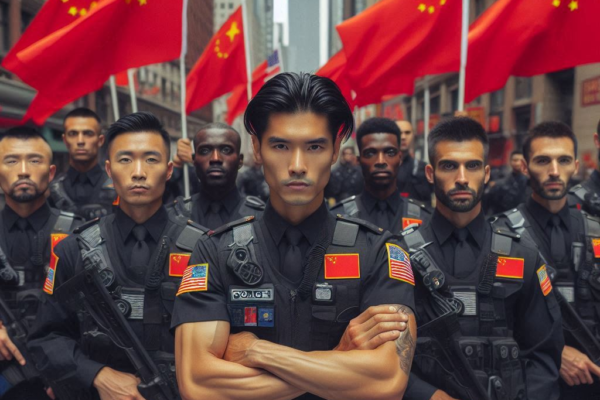China’s international media presence plays a pivotal role in amplifying its reach and reinforcing its soft power propaganda network globally. State-run media outlets like China Global Television Network (CGTN) and Xinhua News Agency broadcast in multiple languages, targeting diverse audiences worldwide. For instance, CGTN offers channels in English, Spanish, French, Arabic, and Russian, ensuring China’s narratives reach a broad spectrum of viewers. Additionally, CGTN’s specialized channels, such as CGTN Turk and CGTN Hausa, operate on popular social media platforms like Facebook and X, further expanding their influence. Xinhua News Agency, dubbed “The World’s Biggest Propaganda Machine” by Reporters Without Borders, is a cornerstone of this strategy. It operates globally, providing content in multiple languages while subsidizing coverage costs to ensure widespread dissemination of Chinese viewpoints. Xinhua’s CNC World, a 24-hour English-language news channel, is designed to offer a favorable view of China, countering foreign media narratives. Moreover, China’s media outlets are available across numerous cable and satellite providers worldwide, making channels like CCTV-4 and CGTN accessible in various regions. This global media network allows China to strategically influence international perceptions, particularly in countries with significant Chinese-speaking populations and in regions where China’s economic interests are strong. For instance, the Global Times, another Chinese state-run outlet, receives significant traffic (average 104.6K monthly organic visits) from countries like India (30%), the United States (27%), and Australia (7%), illustrating the global reach of China’s media apparatus. China Daily, another key player in China’s international media strategy, further amplifies the country’s global soft power. With an organic traffic of 44.8K monthly visits, it reaches a significant audience, particularly in Western and Asian countries. The majority of its readership comes from the United States, accounting for 43% of the traffic, followed by India (9%), Australia (7%), Singapore (6%), and Malaysia (5%). China Daily publishes content in English, making it accessible to a global audience and allowing China to shape international perspectives on various issues. Through these extensive media channels, China effectively promotes its political and cultural narratives, aligning global content with its ideological goals and enhancing its soft power influence on the world stage. Propaganda by Xinhua: Key Examples Xinhua News Agency, as China’s largest and most influential state-run news organization, has been at the forefront of disseminating propaganda that aligns with the Chinese government’s narratives on various contentious issues. During the 2017 Doklam standoff, Xinhua released a satirical video titled “Seven Sins of India,” which portrayed India in a derogatory manner, sparking accusations of racism and anti-Indian sentiment. In 2019, during the Hong Kong protests, Xinhua’s biased portrayal of the protests as violent and illegitimate led to Twitter banning state-sponsored media from ad purchases. Xinhua’s role in spreading propaganda became even more evident during the COVID-19 pandemic, where it downplayed the virus’s threat and emphasized China’s response while ignoring early cover-ups and public discontent. Additionally, Xinhua has been involved in promoting disinformation during the Russian -Ukraine war by supporting pro-Kremlin narratives through digital ads on Facebook. These examples underscore Xinhua’s role in advancing the Chinese government’s propaganda efforts on a global scale. CGTN and Its Role in Chinese Propaganda China Global Television Network (CGTN) is a key player in the Chinese government’s global media strategy, acting as the international arm of China Central Television (CCTV). Controlled by the Central Propaganda Department of the Chinese Communist Party, CGTN broadcasts in multiple languages and aims to promote China’s narratives to a global audience. Over the years, CGTN has been embroiled in various controversies, including the detention of Australian journalist Cheng Lei on national security grounds and its dissemination of disinformation regarding COVID-19. The network has also faced criticism for its biased coverage of significant geopolitical events, such as the 2019 Hong Kong protests, the Russian -Ukraine war, and the Fukushima Daiichi Nuclear Power Plant discharge. These incidents highlight CGTN’s role in spreading Chinese state propaganda, often facing pushback from international regulators. For instance, the United States designated CGTN as a foreign mission, and the UK revoked its broadcasting license in 2021 due to concerns over editorial independence and political control. CGTN’s YouTube Network and Its Global Reach CGTN’s YouTube network is a significant component of its international media presence, leveraging the platform to reach diverse audiences across the globe. The main CGTN channel boasts 3.14 million subscribers, making it the flagship of the network. Other regional and language-specific channels, such as CGTN Africa with 884K subscribers and CGTN Español with 530K subscribers, highlight CGTN’s tailored approach to different markets. The network also includes specialized channels like CGTN Sports Scene (175K subscribers) and CGTN Documentary (9.5K subscribers), further expanding its reach and influence. With content available in multiple languages, including Arabic (588K subscribers) and French (457K subscribers), CGTN’s YouTube channels play a crucial role in disseminating content that aligns with China’s global narratives, making it a vital part of the country’s soft power strategy. Channel Name Subscriber Count CGTN 3.14M CGTN Europe 448K CGTN America 707K CGTN Africa 884K CGTN Documentary 9.5K CGTN Arabic 588K CGTN Global Watch 6.04K CGTN BIZ 2.58K CGTN Sports Scene 175K CGTN Podcasts 3.23K CGTN Global Business 8.14K CGTN Français 457K CGTN UN 193 CGTN Español 530K CGTN на русском 289K The CGTN Soft Power Network with the Subscriber Count Here is a case study of two of its prominent YouTube Channels: YouTube Channel: CGTN Arabic CGTN Arabic, formerly CCTV-Arabic, is an Arabic-language television channel under the China Global Television Network, a subsidiary of China Central Television. The channel serves as a propaganda arm of the Chinese government, disseminating content that aligns with the Chinese Communist Party’s (CCP) agenda. It aims to shape perceptions of China in the Arabic-speaking world, often countering Western narratives and promoting a sanitized image of China, including controversial areas like Xinjiang. Key Propaganda Themes 1. Propaganda to Whitewash Xinjiang’s Image: 2. Promoting China’s Global Influence: 3. Bashing Western Media and Policies: 4. Promoting Chinese Culture and Economic Achievements: 5. Positive Spin on Controversial Issues: Community Engagement In recent years, CGTN Arabic’s community posts have frequently bashed…






